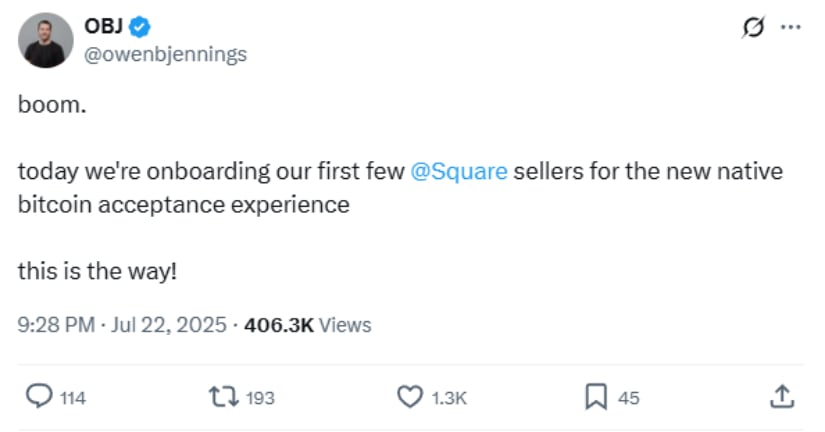Square Bets Big on Bitcoin: 4 Million Merchants to Accept Crypto Payments by 2026
Jack Dorsey's fintech disruptor just fired the starting gun for mainstream crypto commerce—and legacy payment processors should be sweating.
The Play:
Square rolls out Bitcoin payments for its merchant network, targeting 4 million sellers within 12 months. No ‘crypto curious’ hedging here—this is a full-throttle adoption play.
Why It Matters:
While Wall Street still debates ETF flows, Square’s move puts crypto where it counts: in the hands of businesses that actually move product. (Take that, over-leveraged hedge funds.)
The Fine Print:
Zero mention of ‘volatility’ or ‘speculation’ in the announcement—just cold, hard transaction infrastructure. Either they’ve cracked the stabilization puzzle… or they’re betting merchants will happily eat the FX risk for lower fees.
One thing’s certain: When 4 million storefronts start flashing ‘Bitcoin Accepted Here’ signs, even your boomer uncle will ask how to HODL.

The initiative, which began July 22, 2025, allows businesses to accept Bitcoin payments through their existing Square hardware using the Lightning Network.
Initial Rollout Begins with Select Merchants
Square has begun onboarding its first group of sellers to accept bitcoin payments from customers. Owen Jennings, an executive at Block, confirmed the launch on social media, stating that the company is “onboarding our first few Square sellers for the new native bitcoin acceptance experience.”

Source: @owenbjennings
The rollout starts small but has big ambitions. Square serves roughly 4 million merchants across the United States, making this one of the largest potential Bitcoin payment integrations in retail history. The company plans to expand the feature gradually, with full availability targeted for 2026.
Block first announced this initiative at the Bitcoin 2025 conference in Las Vegas on May 27, where attendees could test the system at a merchandise store. The pilot program allowed visitors to buy items by scanning QR codes and paying with Bitcoin.
How the Technology Works
The system uses Bitcoin’s Lightning Network, a secondary LAYER that processes transactions faster and cheaper than the main Bitcoin blockchain. When customers want to pay with Bitcoin, they scan a QR code at checkout. The Lightning Network handles the payment processing while Square manages exchange rate calculations and confirmation notifications behind the scenes.
Merchants have flexibility in how they handle Bitcoin payments. They can choose to keep the Bitcoin they receive or automatically convert it to regular dollars in real-time. This option helps businesses avoid price swings that Bitcoin sometimes experiences.
The technology builds on Square’s existing Bitcoin Conversions feature, launched in 2024, which already allows qualified merchants to convert a portion of their daily sales into Bitcoin automatically.
Business Benefits and Cost Savings
Square’s Bitcoin payment system aims to reduce processing costs for businesses. Traditional credit card transactions typically charge merchants between 1.5% and 3.5% in fees. Bitcoin payments through Square settle in minutes at lower rates, potentially saving businesses money on each transaction.
Real-world results support these claims. Dan Edwards, operating chief of the Steak ‘n Shake restaurant chain, reported at Bitcoin 2025 that his company cut payment processing fees in half by adopting Bitcoin payments. “When customers choose to pay in Bitcoin instead of credit cards, we are saving about 50% in our processing fees,” Edwards said.
The timing aligns with Bitcoin’s strong performance. The cryptocurrency recently hit new all-time highs above $123,000, driven by institutional investment and growing acceptance. Block’s stock jumped 9% when the company was added to the S&P 500 on July 23, the same day the Bitcoin payment rollout began.
Regulatory Challenges and Geographic Limits
The rollout faces regulatory hurdles that could affect its scope. Currently, the feature is not expected to be available to sellers in New York State or outside the United States. Block must obtain regulatory approvals in various jurisdictions before expanding the service.
The company’s official statement notes that the Bitcoin payments feature “is subject to change and may not be available in all locations” and remains “subject to applicable regulatory approvals.”
Block operates under a VIRTUAL currency business activity license from the New York State Department of Financial Services, but additional approvals may be needed for the Bitcoin payments feature specifically.
Block’s Broader Bitcoin Strategy
This payment integration represents just one part of Block’s comprehensive Bitcoin approach. The company ranks as the tenth-largest corporate Bitcoin holder, owning 8,584 BTC worth approximately $935 million at current prices.
Block’s Bitcoin ecosystem includes several products: Cash App allows users to buy, sell, and transfer Bitcoin; Bitkey provides a self-custody Bitcoin wallet; Proto offers Bitcoin mining products; and Spiral funds open-source Bitcoin projects.
The company also reinvests 10% of its Bitcoin-related profits back into Bitcoin purchases each month, demonstrating long-term commitment to the cryptocurrency. Over 1,700 merchants already use Square’s Bitcoin Conversions feature to automatically convert part of their sales to Bitcoin.
Looking Ahead: 2026 Timeline
Block expects to begin broader rollout in the second half of 2025, with full availability to all eligible Square sellers targeted for 2026. This timeline depends on obtaining necessary regulatory approvals and successfully scaling the technology.
The initiative puts Square in competition with other payment providers like PayPal, Coinbase, and BitPay, which already accept Bitcoin payments. However, Square’s non-custodial approach gives users full control over their Bitcoin, aligning with cryptocurrency’s decentralized principles.
Square’s integration could accelerate Bitcoin’s transition from investment asset to everyday payment method. With 4 million potential merchant locations, the rollout represents one of the largest attempts to bring Bitcoin payments to mainstream retail.
The Path Forward for Bitcoin Commerce
Square’s Bitcoin payment rollout marks a significant step toward making cryptocurrency part of regular business transactions. By using existing hardware and simplifying the payment process, Block removes many barriers that previously limited Bitcoin adoption in retail settings.
The success of this initiative will likely influence other payment processors and could accelerate broader acceptance of Bitcoin in everyday commerce. With regulatory approvals pending and technology testing underway, 2026 may prove to be a turning point for Bitcoin’s role in the retail economy.

